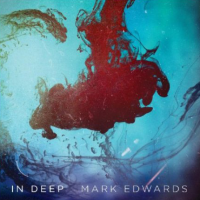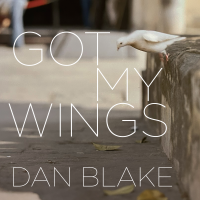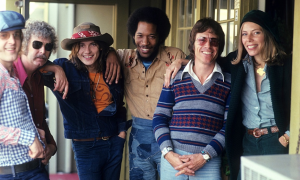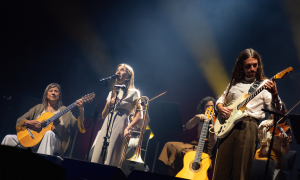Home » Jazz Articles » Profile » Howard Riley: Live with Repertoire
Howard Riley: Live with Repertoire
 Pianist Howard Riley turned 70 in February and belatedly celebrates the event with the release of a new CD, Live with Repertoire (NoBusiness Records). It's a really strong live, solo set of standards and a few original tunes recorded last year in Leicester and one that emphasises one particular aspect of his playing. Riley remains one of the most gifted interpreters of the jazz repertoire in Britain or beyond.
Pianist Howard Riley turned 70 in February and belatedly celebrates the event with the release of a new CD, Live with Repertoire (NoBusiness Records). It's a really strong live, solo set of standards and a few original tunes recorded last year in Leicester and one that emphasises one particular aspect of his playing. Riley remains one of the most gifted interpreters of the jazz repertoire in Britain or beyond. The last few years have not been easy for Riley. It was on a gig at the Royal Festival Hall in a trio with Barre Phillips and drummer Steve Noble and that he first noticed something was wrong. He couldn't make his left hand work and played the set out just using his right. It came back but a few weeks later on a recording session, Riley found he couldn't play at all. The diagnosis was swift and shocking. He had Parkinson's Disease. He was forced to stop playing for a month—a time he describes as 'the worst period of my life'—but, thankfully, once his medication was sorted out, it all came back though a certain loss of strength meant a revision of technique.
This all makes Live with Repertoire all the more remarkable because Riley's own personality and individuality shines through a series of tunes such as "Round Midnight," "Body and Soul" and the delightful perennial "Darn That Dream." It is clear that Riley has approached the condition with a certain amount of stoicism and with a strong determination to continue doing what he loves—playing jazz.
"You have to really come to terms with the psychological aspect," he says, "because it's not going to get better. It's degenerative. That's the hardest thing of all. It doesn't go away but then...so far, so good." Then he adds laughing, "Live with Repertoire is my first post-Parkinson's record, though that's not exactly a great selling point!"
Riley was born in Huddersfield. His dad was an engineer but, in his spare time, he was also a keen dance band pianist. Although Riley senior played by ear, he started his son on piano when he was just 6 years old. Until university, this was the only instruction, the pianist had on the instrument. Then in his teens, Riley started getting into jazz.
"That was the music that caught my ear," he says. It was Bud Powell and Monk, whose playing resonated most for Riley, though George Shearing was also an interest for a time, but as he notes, "I soon realised that Bud Powell was a rather more serious proposition. So, aesthetically, I began to sort it all out in my head." Whilst still at grammar school, Riley formed his own trio playing 3 times a week in local clubs. "That was more than I've done since," he says laughing.
From school, he went to the University of Wales in Bangor to study literature but changed to music after his second year. "I rather blagged my way onto that, persuading them that they needed me there studying music," he explains. "I was lucky because there were two fairly contemporary composers on the faculty—Reginald Smith- Brindle and Bernard Rands, who is still alive and ended up teaching at Yale. It could have been a waste of time but it was actually quite stimulating because they were into contemporary things."
At the same time, Riley continued playing jazz forming another trio. "I tried to get the bassist into playing like Scott LaFaro but he wasn't having it," he laughs. Nevertheless, despite such limitations, the trio was good enough to make it to the finals of the National Jazz Federation Student Competition in 1963 at the Fairfield Halls in Croydon. Also, on the bill were groups from Leeds featuring pianist Brian Priestley, one from Oxford with critic and wit Miles Kington on bass, another from Birmingham with later Spencer Davis drummer Pete York and more significantly a group, also from the UK's second city, with Evan Parker on flute and saxophone.
"I remember walking down the hallway," he tells me, "and there was the sound of a very Coltraneish tenor coming out of the dressing room. I thought he's really good. Of course, we were all copying but I realised what he was doing was off the latest Coltrane record. So, I popped my heard round the door and introduced myself. That's how I met Evan Parker"
With a BA and an MA in music from Bangor, Riley then studied for a further degree at Indiana with George Russell alumnus, David Baker. It was the connection to Russell's music connection, in particular Esthetics with Eric Dolphy, that encouraged Riley to make contact with Baker and his jazz course at Indiana State. Baker made a big impression on the young man, who also played in the university big band.
"He would never fix the solo order. So, you had your written stuff but you had to be on your toes because it might be you up next. He was good like that and I really liked him a lot. I keep Googling him and he's still doing things!"
Riley's approach to the piano is not easy to pin down. He's so much more than his acknowledged inspirations—from Bud Powell and Monk, through Ellington and Bill Evans. In his case, there is a sense, of which Riley is aware, that his career has involved a series of different phases. Though the journey has seen him discard some things along the way, he has also retained what he has found of most value, bringing these different elements together in a unique, highly distinctive style.
As he puts it, "I've realised with me that there's always change happening, which is good. But when I've changed I've still kept the best bits from before. If you heard me in Huddersfield in 1960, I was playing changes. If you heard me in London in the late 60s and early 70s, you'd have heard me playing free music because that was the logical thing after playing changes and set forms. Yet, you can always bring certain things from previous areas. Some things you just exhaust and, then when you get older, it becomes a case of pulling it together and hopefully that's where I'm at now."
It follows that Riley regrets nothing he has done over a jazz life that now spans 55 years. He even played at Butlin's holiday camp whilst at college and did a spell on the boats, 'playing commercial music.' As he says ruefully, "It was good because it put me off it for life." For him, the key is to build something and to do so requires an understanding of the basics of jazz history. As he says, "I am a believer that you need to know a bit about that in order to advance. Leaping straight into free playing as such is fraught with perils."
Not that the choices that he has made along the way have been easy ones. The jazz audience, not least in the UK, can be quick to pigeonhole or locate an artist at a particular point. "Records are the last thing left standing," he says, "because you can look back and say that that was 1968 and that was what was happening then. That's why I've always tried to make the next record a bit different from the last one, though the problem is that most people listen to a record and think, 'Ahah! That's it. I've nailed him.' But they might be listening to something you did in 1976 but not hearing it in context."
This has led to difficulties—for him and others—in gaining access to the broader jazz audience he deserves. Riley is hugely respected by the most adventurous performers and listeners—there is a very good reason why he has been first choice pianist in Barry Guy's London Jazz Composers Orchestra. Check out his solo on "Part IV —Strophe II"from Ode. But more conservative fans ignore, for example, recordings where his love of bebop and of Ellington and Monk have been to the fore, such as The Monk & Ellington Sessions and now Live with Repertoire.
Of course, large ensemble gigs have been rare, such activity largely restricted to work with the LJCO. Beyond that one can divide Riley's activity into four distinct, if related (through the cross-fertilisation of his own approach to and ideas about music) areas—solo, overdubbed piano, trio and small group. It is perhaps the latter for which the pianist is least known. However, as he points out he played in Barbara Thompson's first quartet and there have also been groups with saxophonist Art Themen and the late Elton Dean, as well as a quartet with Barry Guy, Trevor Watts and John Stevens. That group produced the excellent Endgame in 1979 for ECM. According to Riley, some six hours of music was recorded leading John Stevens to start having fantasies about 10 CD box sets.
More recently, the band with Elton Dean, bassist Paul Rogers and drummer Mark Saunders (Descending Circles 1995) provided a wonderful example of how in jazz four such highly inimitable talents can come together to make music that allowed each individual to achieve creative heights in the context of the collective. Riley's comments reveal not just the quartet's virtues but how his own musical attitude was reflected within it.
"We could play in different areas together. It wasn't, 'Oh, now let's play free.' You didn't really notice when we played free or play changes." And he compares this to fellow pianist Paul Bley's way of working. "You don't say, 'This is Paul Bley playing changes and now he's playing free.' You just think that's Paul Bley. To me, that's the ultimate sophisticated development in playing. And another is that with free playing, it's like anything else, like bebop—after a while you get to know it and it's just as prone to cliché. What's important is to keep developing because the temptation is to say, 'That's it.'"
For a player who has recorded and performed so often solo, one of the most noteworthy, even paradoxical, characteristics of Howard Riley's work lies in the fact that he is also such a wonderfully empathic musician. Riley's history is a testament to the notion that, often, individual excellence is achieved in the context of a collective of equally empathic, articulate peers. His recording career began with Discussions (1967), featuring Barry Guy and Jon Hiseman. It was a very limited release and is now one of the most collectable of jazz records. Angle (1969) and the astonishingly beautiful The Day Will Come (1970) followed for CBS, with Alan Richard Jackson replacing Hiseman on the drums. Two further trio albums followed—Flight (1971) for producer Peter Eden's short-lived Turtle label and Synthesis on Incus (1973)—with Tony Oxley on drums. On these last two records, Oxley and Guy were already using electronics. With the two CBS sets coming out in 2014 on Hux Records, all of these records will be available for the first time on CD and what an astonishing sequence of releases they were and are.
How many pianists have in recent times been credited with 'reinventing the piano trio'? It's an irony not lost on Riley. "I read this stuff about the revival of the piano trio," he says, "but they never mention what we did in the 60s, 70s and 80s, although it's all been reissued on CD. Nobody ever says that this stuff was way ahead of what's being done nowadays. The piano trios I've heard recently, I found terrible. It doesn't seem to be extending the tradition of the piano trio. That particular version of the trio with Tony and Barry never gets mentioned. Incredible! I've got fairly relaxed about it—what can you do about it? What would be interesting would be to know what some of the younger guys would think about it, if they ever heard it. It's like Miles said about Wynton Marsalis when he first appeared, "Didn't we get it right the first time?'"
Riley may be relaxed about it but it is galling, for example, that Esbjorn Svensson, Brad Mehldau, the The Bad Plus and even lesser talents have been praised for using electronics. Listen to Flight, Synthesis and the only recently released Overground and ask yourself just who are the real pioneers? Or get hold of copies of his three piano records, Trisect from 1981 or Three is One. Now that really is 'reinventing the piano trio!'
In the end, it seems to come down to record company marketing strategies. And that's unfortunate, because I have no doubt that musicians of integrity like Svensson and Mehldau would have been only too happy to acknowledge Riley's achievements, assuming they knew of his work. Therein lies the rub. Riley may follow an exacting muse but this music—in particular, The Day Will Come, Flight and Synthesis—is both in the great tradition of the piano trio and succeeds in reinvigorating it at the same time. In a way, Riley is following on from the great Bill Evans trio with Scott LaFaro and Paul Motian. It is something that the pianist recognises full well.
"Looking back, that group was probably the beginning of freeing everything up," he notes. "Up till then, if you played jazz in a piano trio, the bassist just walked and the drummer kept time and the piano was on top of that. At the time you didn't really think about but that's where it began."
It's an approach that relies on the musicians listening to each, being open to possibilities and sharing a performance aesthetic and ethic that emphasises invention over repetition and isn't that what jazz is supposed to be about? This is a virtue one finds time and again in Riley's work, whether on the lovely trio record Wishing on the Moon, with bassist Mario Castronari and the late Tony Marsh on drums or in the pianist's wonderful duets with Keith Tippett (The Bern Concert from 1993, First Encounter from 1981) and with Jaki Byard (Live at the Royal Festival Hall from 1984).
Riley met Tippett not long after the latter arrived in London in 1969, as he tells me, "We've known of each other's playing ever since Keith hit the London scene. I arrived a couple of years before him. Funnily enough, the first gig with the Keith Tippet sextet was opposite my trio at the 100 Club back in early '69. We got together and started playing together in early 80s as a piano duo. We've done quite a few records now. With Keith, we literally sit down and play. We never discuss the music."
With regard to Jaki Byard, Riley first met him during a year spent at the Buffalo Centre of the Creative and Performing Arts. He was down in Greenwich Village one day and heard this music coming out of a small club and realised immediately that it was Byard. They got talking and a few years later, Riley suggested the pianist for an Arts Council tour along with himself and a couple of other solo piano players. The highlight of their involvement was a Royal Festival Hall gig in 1984. As he explains, working in a duo with Byard required a very different approach to that with Keith Tippett,
"With Jaki, we used tunes and changes. It seemed the obvious thing to do with Jaki because he was such a wonderful player in terms of playing that stuff. It was a real treat for me to do that with somebody of that calibre. But as piano duos, the one with Keith and the one with Jaki, they're two totally different things. If you slap labels on it, you miss the point really because with Jaki, though we were playing on tunes, we had a fabulous kind of freedom in there. It's just a different kind of freedom really."
For Riley there is no contradiction here. The course that he and his peers embarked upon in the mid-to late-sixties was a natural, almost organic one, as he explains,
"But the thing with everybody I played with in the sixties was that they all had a very good grounding in, for want of a better word, conventional music. What I'm saying is that what they eventually called 'free jazz,' that came out of a quite disciplined approach using conventional music and, in fact, a lot of people... the developments they made were what you would do when you get dissatisfied with playing in a certain way."
And he continues,
"My theory about this is that in jazz everybody is aiming for greater freedom in their playing whether they know they are or not. Because once you've started playing the tendency is to free things up rather than to make them more rigid and hide-bound and really so called freer playing was a very logical development in the sixties from playing conventional jazz because to begin with there wasn't any free improvisation."
And form remains an important aspect of Riley's approach. It's not for nothing, that two recent albums have been called 'Short Stories.' In fact, these words define the pianist very well. Whether improvising or playing standards, he is a story-teller building a narrative. In turn, that narrative can take different forms—it can become a ballad, an elegy, a blues, a dance tune or even transform through the language of stride piano but always with Riley's distinctive imprint. At times, the word 'novella' would be more appropriate—there are several examples of this on the six CD set The Complete Short Stories. But even there, the emphasis on form and architecture within the improvisation lends an economy and directness that few others could match. So, how does Riley see the relationship between improvisation, form and composition in terms of his work?
"Good question, actually. I hope when I play that people can just sit back and listen to it and not worry too much about which bits are written or improvised," Riley tells me. "It should feel like it's all improvised but there's actually quite a few elements of composition in there. Usually, I sit down in advance and compose a couple of themes or it might be some rhythmic ideas or a set of changes. Those are only techniques that are there to be used. So, there is a certain amount of composition but it's minimal."
In fact, what Riley is saying almost offers a definition for much of the finest jazz. Different degrees of freedom have been there in jazz right from the start, as he points out, "If you take it back to Louis Armstrong and the Hot Five recordings—maybe not the people he was playing with—but he was flying over the top of that in the stuff he was doing in terms of notes and rhythms. So, it's always been there. I realise that you have to label music as a guide for people but it is kind of difficult."
It won't surprise that Riley rejects any attempt to turn jazz into a repertory music. As he says, "It's a music of individuals and individuality. Once you get away from that...as I've found out, it takes years to find your own individuality. So, it's not easy. But all the pressure is the other way. We live in a free market society and jazz has become a bit of a brand, which is anathema to me. This is what young players have to fight against."
Selected Discography
Howard Riley Trio Discussions (Opportunity 1967; Jazzprint 2007) Howard Riley Trio Angle (CBS Realm 1969; Sony-Columbia 1999; Hux Records 2014) Howard Riley Trio The Day Will Come (CBS 1970; Sony-Columbia 1999; Hux Records 2014) Howard Riley Trio Flight (Turtle 1971; Future Music Records 1995) Howard Riley Trio Synopsis (Incus 1973; EMANEM 2000) London Jazz Composers' Orchestra Ode (Incus 1972; Intakt 1996) Howard Riley Singleness (Canon 1976; Jazzprint 2001) Barry Guy, Howard Riley, John Stevens, Trevor Watts Endgame ECM/Japo 1979) Howard Riley Trisect (Impetus 1981; Jazzprint 2001) Jaki Byard/Howard Riley Live at the Royal Festival Hall (Leo Records 1984; part reissue as Feathers Slam Records) Keith Tippett/Howard Riley The Bern Concert (FMR 1993; Jazzprint 1994—as Interchange) Riley-Castronari-Marsh Wishing On The Moon (FMR 1993) Howard Riley/Elton Dean Quartet Descending Circles (Blueprint 1995) Howard Riley/Art Themen Quartet Classics (live) (Slam 1996) Howard Riley At Lincoln Cathedral (Heliopause 2005) Howard Riley Three Is One (ASC 2008) Howard Riley The Monk & Ellington Sessions (33 Records 2009) Howard Riley Solo in Vilnius (NoBusiness Records 2009) Howard Riley The Complete Short Stories—1998/2010 (NoBusiness Records 2010—6CD box set) Howard Riley Live with Repertoire (NoBusiness Records 2013)
Tags
Howard Riley
Profiles
Duncan Heining
United Kingdom
London
NoBusiness Records
Barre Phillips
Steve Noble
Bud Powell
George Shearing
Scott LaFaro
Brian Priestley
evan parker
George Russell
David Baker
Eric Dolphy
Bill Evans
barry guy
London Jazz Composers Orchestra
Barbara Thompson
Art Themen
Elton Dean
Trevor Watts
Paul Rogers
Paul Bley
Jon Hiseman
Alan Jackson
Tony Oxley
wynton marsalis
Esbjorn Svensson
brad mehldau
Bad Plus
Paul Motian
Mario Castronari
Tony Marsh
Keith Tippett
Jaki Byard
PREVIOUS / NEXT
Support All About Jazz
 All About Jazz has been a pillar of jazz since 1995, championing it as an art form and, more importantly, supporting the musicians who make it. Our enduring commitment has made "AAJ" one of the most culturally important websites of its kind, read by hundreds of thousands of fans, musicians and industry figures every month.
All About Jazz has been a pillar of jazz since 1995, championing it as an art form and, more importantly, supporting the musicians who make it. Our enduring commitment has made "AAJ" one of the most culturally important websites of its kind, read by hundreds of thousands of fans, musicians and industry figures every month.


























